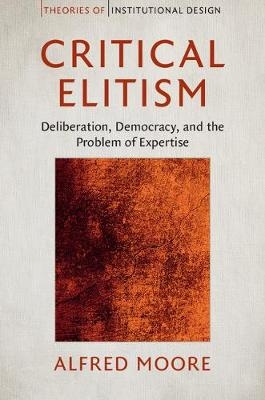
Critical Elitism
Deliberation, Democracy, and the Problem of Expertise
Seiten
2017
Cambridge University Press (Verlag)
978-1-107-19452-6 (ISBN)
Cambridge University Press (Verlag)
978-1-107-19452-6 (ISBN)
How are we to handle the tension between expertise and democracy? Developing a democratic model of expert authority, this book describes the ways in which civil society, expert institutions, and democratic innovations can contribute to its production. It addresses deliberative democrats, but will also interest scholars working in environment, health policy, and science communication.
Democracies have a problem with expertise. Expert knowledge both mediates and facilitates public apprehension of problems, yet it also threatens to exclude the public from consequential judgments and decisions located in technical domains. This book asks: how can we have inclusion without collapsing the very concept of expertise? How can public judgment be engaged in expert practices in a way that does not reduce to populism? Drawing on deliberative democratic theory and social studies of science, Critical Elitism argues that expert authority depends ultimately on the exercise of public judgment in a context in which there are live possibilities for protest, opposition and scrutiny. This account points to new ways of looking at the role of civil society, expert institutions, and democratic innovations in the constitution of expert authority within democratic systems. Using the example of climate science, Critical Elitism highlights not only the risks but also the benefits of contesting expertise.
Democracies have a problem with expertise. Expert knowledge both mediates and facilitates public apprehension of problems, yet it also threatens to exclude the public from consequential judgments and decisions located in technical domains. This book asks: how can we have inclusion without collapsing the very concept of expertise? How can public judgment be engaged in expert practices in a way that does not reduce to populism? Drawing on deliberative democratic theory and social studies of science, Critical Elitism argues that expert authority depends ultimately on the exercise of public judgment in a context in which there are live possibilities for protest, opposition and scrutiny. This account points to new ways of looking at the role of civil society, expert institutions, and democratic innovations in the constitution of expert authority within democratic systems. Using the example of climate science, Critical Elitism highlights not only the risks but also the benefits of contesting expertise.
Alfred Moore is a research fellow at Cambridge University, at the Centre for Research in Arts, Humanities and Social Sciences. He has published in a wide range of journals, including Political Studies, Critical Review, the Journal of Political Philosophy, Episteme, Economy and Society, and Public Understanding of Science, among others.
Acknowledgements; Introduction; 1. Two faces of epistemic democracy; 2. Democracy and problem of expertise; 3. Political and epistemic authority; 4. The problem of judgment; 5. Contestation; 6. Consensus; 7. Institutional innovations; Conclusion; References; Index.
| Erscheinungsdatum | 04.05.2017 |
|---|---|
| Reihe/Serie | Theories of Institutional Design |
| Zusatzinfo | Worked examples or Exercises; 1 Line drawings, black and white |
| Verlagsort | Cambridge |
| Sprache | englisch |
| Maße | 160 x 235 mm |
| Gewicht | 480 g |
| Themenwelt | Sozialwissenschaften ► Politik / Verwaltung ► Politische Theorie |
| ISBN-10 | 1-107-19452-0 / 1107194520 |
| ISBN-13 | 978-1-107-19452-6 / 9781107194526 |
| Zustand | Neuware |
| Haben Sie eine Frage zum Produkt? |
Mehr entdecken
aus dem Bereich
aus dem Bereich
Der »progressive« Angriff auf Israel, Judentum und …
Buch | Softcover (2024)
edition TIAMAT (Verlag)
28,00 €
ein Vortrag
Buch | Softcover (2024)
Suhrkamp (Verlag)
10,00 €


